Colorado is in the middle of the Rocky Mountains.
It’s about the last place you would expect to see an alligator.
Many areas are a mile high, or even more than 10,000 feet above sea level.
Alligators like sea level and like warm climates.
There are no native alligators in Colorado, but there are surprises out there.
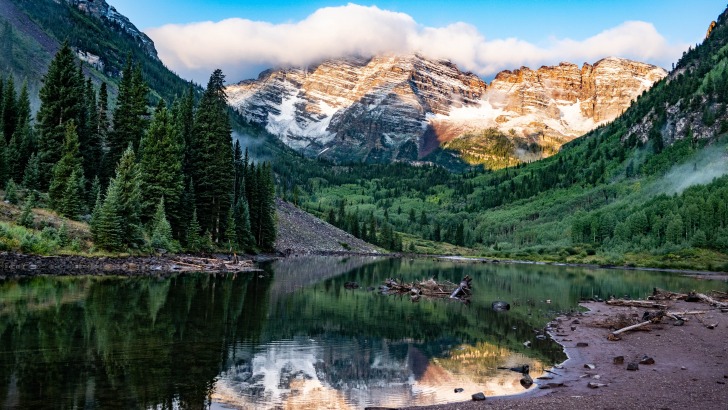
Contents
So… Are there alligators in Colorado?
There are no native alligators in Colorado, but there are some that have been brought there by people.
Most are in zoos, and one shows up in the wild from time to time.
One of the more interesting alligator sites in Colorado is in the San Luis Valley, about three hours south of Colorado Springs, and near the town of Alamosa.
Hot springs there keep the water warm, if not hot, year-round, and it is a good environment for alligators.
You may see them sunbathing in the snow, but they can easily get back into the hot water any time they want.
An enterprising Tilapia fish farming business keeps about 300 alligators and they eat up all the fish scraps produced.
The owners started the operation in 1987, and since then they have taken in a lot of rescues that people cannot take care of anymore.
They let the public in to see the alligators, and you can even wrestle with the gators.
They have also added a couple of crocodiles to the mix.
It’s one of the largest collections of alligators you will find outside the southeastern United States.
They started their farm in the early 1980s and brought a couple of alligators to help dispose of fish scraps.
Soon other people were bringing them alligators, and the farm grew from there.
Other than that, alligators have been very rare in Colorado.
In 2010, someone caught one on the Colorado River near a town where a circus had been, and one of the alligators had escaped.
A fake one was found on the Colorado river in 2019, and because they are so rare, that made the news.
Some people have reported seeing alligators in the Colorado River, but none have been found by game officials.
Game and wildlife officials are doubtful that they are really there because the winters would be much too cold for them to survive.
Some are spotted now and then in other states, where people have abandoned them, but even this practice is extremely rare in Colorado.
Alligator species in Colorado
There are no native alligators in Colorado, but there are some that have been brought there.
Those that are there are of the American Alligator species.
There are only two species of alligator, and the other one lives in China.
They are part of the crocodile family, but there are other species of crocodiles.
Is it safe to swim in Colorado?
In general, yes, it is very safe to swim in Colorado. Mountain streams and rivers are generally clear and clean.
Lakes are generally also fairly clear and clean.
There are a lot of places you can swim in Colorado.
Dealing with cold water might be the biggest obstacle to swimming in the state’s natural water areas.
It is very unlikely you will see an alligator or any other kind of water predator.
Snakes can be an issue in some places but they are not common.
Colorado averages 1.33 deaths per 100,000 people drowning each year, which is 25th, right at the national average.
Most water injuries are caused by boating accidents.
Some rivers have strong currents and they can be a danger as well.
Interesting alligator facts in Colorado
The alligator farm near Alamosa is the largest collection of alligators outside the southeast of the nation.
The 300 alligators are kept alive by hot springs in winter and eat fish scraps from the fish farm where they live.
Alligators could not survive the cold Colorado winters if they were not at the hot springs.
They can do rather well in cold water though, as long as it does not freeze.
They go into a state of brumation, which is similar to hibernating.
Their body slows down and they do not eat, though they do drink some in this state.
Alligators continue to grow throughout their lives, though the rate of growth slows as they get into adulthood.
Alligators can live more than 60 years, either in the wild or in captivity.
It is illegal to own an alligator in Colorado.
The only people allowed to have them have licensed wildlife parks or zoos.
Alligators and crocodiles have very strong mouths.
An alligator can bite with a force of 3,000 pounds per square inch.
Crocodiles have the most powerful bite of any creature, at 3,900 pounds per square inch.
A human can bite with 100 pounds or so of force.
They have weak muscles for opening their mouths.
While an alligator could easily bite off a person’s arm, a person can hold an alligator’s mouth shut with one hand easily.
The teeth of alligators grow back if they get broken or worn down.
Alligators have about 80 teeth but may go through 1,000 or more over their lifetime.
Alligators are similar to dinosaurs, and fossils of creatures looking like alligators have been found in Colorado that are many millions of years old.
Scientists say that the current alligator has not changed in eight million years, making the American Alligator one of the oldest species in the world.
They say it has been essentially unchanged by evolution for millions of years.
There are only a few species of shark that are older than the American Alligator.
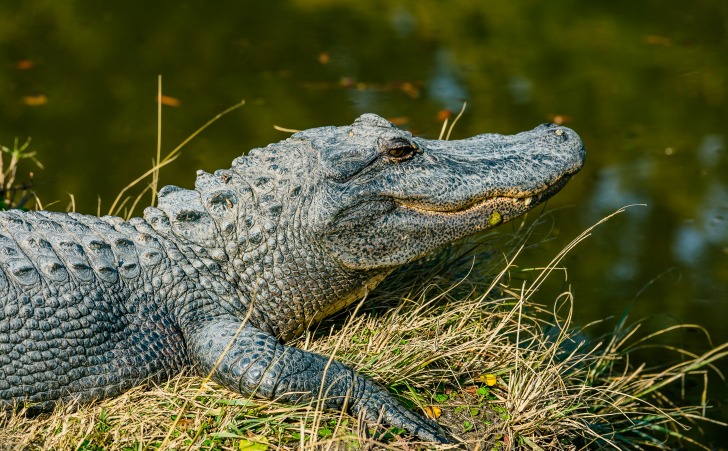
Alligators vs. Crocodiles
Your chances of seeing an Alligator outside the southeast United States are pretty slim, and your chances of seeing a crocodile are even slimmer.
There’s only one place in the world where they live naturally together, and that is the south end of Florida.
They are closely related creatures, but there are some bi-f differences.
Crocodiles are much bigger. They can get up to 20 feet long and weigh 2,000 pounds.
Alligators are about half that size, growing to as much as 12 feet long and 800 pounds.
Alligators are dark gray in color and have a cream-colored underbelly.
Crocodiles are lighter, either olive green or light brown.
Crocodiles also have a cream-colored underbelly.
Alligators have web-shaped toes on their feet, which help them with swimming.
They tend to get in the water more than crocodiles do.
Crocodiles do not have webbed feet and can move around faster on the ground than an alligator.
There are only two species of alligator and they are naturally only in the United States and China.
There are several species and a lot of variety among crocodiles that can be found in tropical climates around the world.
Crocodiles have 66 teeth. Alligators have a little more variety but average 80 teeth.
Because of the shape of their heads, crocodile teeth are visible when it closes its mouth.
Alligator teeth are not visible with the mouth closed.
Alligators have a more rounded, U-shaped snout, and crocodiles have a more V-shaped, or pointed snout.
Crocodiles like saltwater and freshwater.
Alligators do not tolerate saltwater.
3 safety tips for swimming in-Alligator-infested waters
You will not find alligator-infested waters in Colorado unless you visit the fish farm-gator wildlife park near Alamosa.
You can go so far as to wrestle with the Gators there. Still, there are some safety tips to keep in mind when swimming in Colorado.
- Water temperature. Water is generally cold in Colorado, and if you are not from Colorado, it may be a lot colder than you are used to. You can develop cramps while swimming in cold water, so it is good to be mindful of your condition while out there. Cold water can cause hyperthermia as well before you realize it is happening.
- Watch the currents. Sometimes rivers flow faster than they appear, with underground currents that can be swift. Water currents can carry you far from where you want to go, and it can be hard to free yourself if you get caught in one. Pay attention to local warnings about currents and water temperatures. The state uses flags to alert swimmers. A green flag means it is safe for swimming, and other colors signify dangers.
- Wear protection. There are several beaches and state parks along the Colorado River where people like to swim. The water can be very cold. You can get an insulated swimming outfit to keep you warm. It is also good to wear sunscreen when exposed to the sun, even when you are not hot.
Summary
Alligators are very rare in Colorado.
There is one alligator park that has a lot of them, and there are a few in zoos.
They are extremely rare otherwise.
They are not legal to own in Colorado, but sometimes people get one as a pet and have to get rid of it when it gets too big.
Colorado Safety Overview
READ THE FULL REPORT: Colorado Safety Review
Safety Index:
- OVERALL RISK: LOW
- TRANSPORT & TAXIS RISK: LOW
- PICKPOCKETS RISK: LOW
- NATURAL DISASTERS RISK: MEDIUM
- MUGGING RISK: LOW
- TERRORISM RISK: LOW
- SCAMS RISK: LOW
- WOMEN TRAVELERS RISK: LOW
Frequently Asked Questions
Is having an alligator as a pet a good idea?
It is illegal in Colorado and most other states to own an alligator.
Beyond that, they grow and get very big.
They are not trainable and remain wild animals no matter what you do.
Most people do not have the space or facilities to deal with an alligator as it gets bigger.
They are small when they are babies, and can be cute.
However, they will soon be four feet long and weigh a couple of hundred pounds.
They get bigger from there.
Most people dispose of them in wildlife areas, also illegal, after they get too big to handle.
Could an alligator survive on its own in Colorado?
Other than those living in the hot springs at the park in the southern part of the state, it would be very unlikely that one could survive.
The winters are very cold and last a long time.
If the water does not freeze all around them, they can survive cold water by entering a brumation, but the water is too cold in most of the state for even that to help.
Are alligators an endangered species?
They are not now, but they were at one time due to overhunting.
In the late 60s, they declared an endangered species and it was illegal to hunt or kill them.
Since then their population has been restored in the southeastern United States.
There are controlled hunts at times, and some big ones are caught.
There are also alligator farms now that produce alligator meat and alligator skins.
Can you really wrestle an alligator in Colorado?
Yes.
While alligators are very rare in the state, there is a collection of them at a wildlife park in the southern part of the state.
Owners allow people to wrestle with alligators after some training, and it is quite an adventure.
It is not necessarily safe and you could get hurt, but you can if you wish.
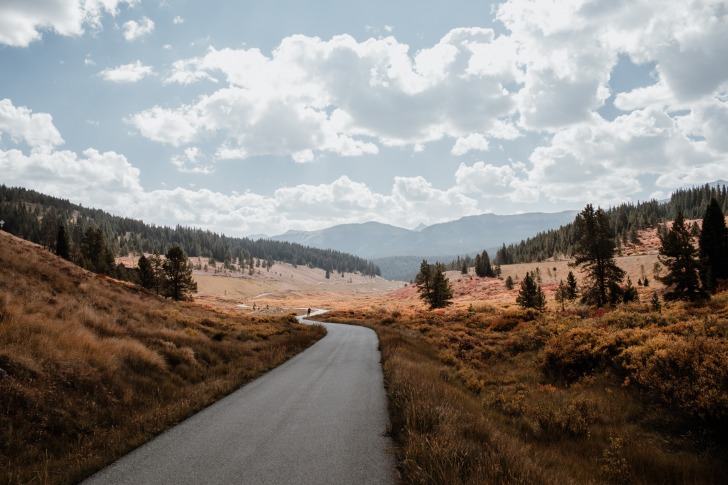



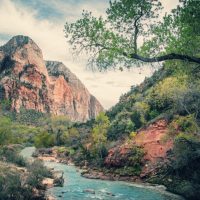

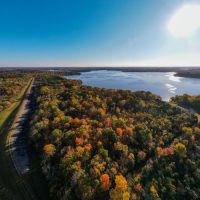





The state is too cold for them.
Most people who swim in Colorado do not have to worry about alligators, but there are some other safety concerns in the water.
Be sure to pay attention to water temperature, currents, and wear protection while swimming in Colorado.
Despite the rarity of alligators in Colorado, it is still important to be aware of their potential presence and take necessary precautions while swimming in the state’s natural water areas.
As a local, I can confirm that there are no native alligators in Colorado, but there is an alligator park near Alamosa where you can see them.